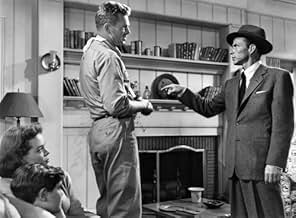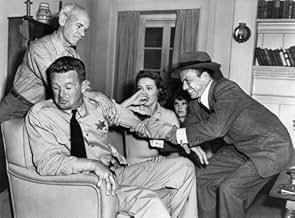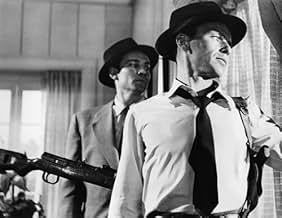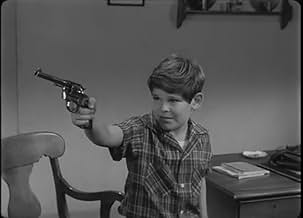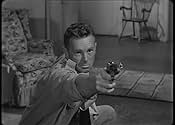VALUTAZIONE IMDb
6,8/10
7812
LA TUA VALUTAZIONE
Nella città di Improvvisamente, tre gangster intrappolano la famiglia Benson nella loro casa con l'intenzione di uccidere il presidente degli Stati Uniti.Nella città di Improvvisamente, tre gangster intrappolano la famiglia Benson nella loro casa con l'intenzione di uccidere il presidente degli Stati Uniti.Nella città di Improvvisamente, tre gangster intrappolano la famiglia Benson nella loro casa con l'intenzione di uccidere il presidente degli Stati Uniti.
- Regia
- Sceneggiatura
- Star
James O'Hara
- Jud Hobson
- (as James Lilburn)
John Beradino
- Trooper
- (non citato nei titoli originali)
Richard Collier
- Ed Hawkins
- (non citato nei titoli originali)
Roy Engel
- Driver Asking Slim for Directions
- (non citato nei titoli originali)
Hans Moebus
- Schultz
- (non citato nei titoli originali)
Ted Stanhope
- Driver Asking Tod for Directions
- (non citato nei titoli originali)
Recensioni in evidenza
in fact some rather too well with unnecessary plot descriptions. My reactions were mixed, but SUDDENLY is worth seeing for three reasons:
1) Early Sinatra, of course. This is the kind of role he would not, to the best of my knowledge,repeat. My mother has long had a crush on him, an infatuation undimmed when she saw the film with me on P.B.S.
2) This movie is a study of the ideals and point of view of mid-1950s America. SUDDENLY was made after the Hollywood investigations of the later 1940s and whilst the McCarthy Paranoia was still going on. None of the other commentators have noted that item, but one should take note that the studio big-wigs had had the bejaysus scared out of them. American film was not only to refrain from social criticism, but was going to be a cheerleader for the essential rightness of the American Way of Life and character. SUDDENLY oozes this point of view, and I note with amused contempt the very last scene and what the two protagonists say to one another.
3) The film is a foreshadowing of what is to come in a country so sure of its social and political stability, quite accidental to be sure. Yes, the head bad guy is a nutter, but he is not the comfortable one-lone-nutter. This plot is highly organised and obviously well-financed. The unspoken They have turned to a pool of violence that is highly American -- organised crime -- to do the deed. Baron and his plotters are not ill-shaven Marxists or slanty-eyed types. They are as American as the Colt 45, and they are willing to do the unthinkable for enough money, and in the leader's case, the simple thrill of bagging someone.
I do not know whether SUDDENLY "rises" to the level of Film Noir, but it had some disturbing things for postWar Americans. Perhaps that is why it is not well known in the Sinatra gallery, and indeed I had never heard of it until about six years ago.
1) Early Sinatra, of course. This is the kind of role he would not, to the best of my knowledge,repeat. My mother has long had a crush on him, an infatuation undimmed when she saw the film with me on P.B.S.
2) This movie is a study of the ideals and point of view of mid-1950s America. SUDDENLY was made after the Hollywood investigations of the later 1940s and whilst the McCarthy Paranoia was still going on. None of the other commentators have noted that item, but one should take note that the studio big-wigs had had the bejaysus scared out of them. American film was not only to refrain from social criticism, but was going to be a cheerleader for the essential rightness of the American Way of Life and character. SUDDENLY oozes this point of view, and I note with amused contempt the very last scene and what the two protagonists say to one another.
3) The film is a foreshadowing of what is to come in a country so sure of its social and political stability, quite accidental to be sure. Yes, the head bad guy is a nutter, but he is not the comfortable one-lone-nutter. This plot is highly organised and obviously well-financed. The unspoken They have turned to a pool of violence that is highly American -- organised crime -- to do the deed. Baron and his plotters are not ill-shaven Marxists or slanty-eyed types. They are as American as the Colt 45, and they are willing to do the unthinkable for enough money, and in the leader's case, the simple thrill of bagging someone.
I do not know whether SUDDENLY "rises" to the level of Film Noir, but it had some disturbing things for postWar Americans. Perhaps that is why it is not well known in the Sinatra gallery, and indeed I had never heard of it until about six years ago.
When the President decides to pass through the small town of Suddenly on route to a fishing trip, the town's police and chief officials rise to meet the challenge of assuring his protection as there have been rumors of an assassination attempt.
The hired guns meanwhile make plans of their own. They cleverly trick their way into the home of the best house in town from which to try and carry out their assassination plot - the house of Pop Benson, respected citizen with an house upon an hill that overlooks the President's planned arrival destination. Now only an handful of hostages stand between the President and doom...can they in some way warn him in time?
Frank Sinatra steals the show here as the ruthless criminal mastermind behind the want-to-be assassins - a man named John Baron. He is downright brutal and nasty in the role--an utterly detestable villain who does remind us the it was the army that created him and made him into a killer or maybe deep down, it's just that he was always a killer at heart. An outstanding multi-dimensional performance from Sinatra.
Sterling Hayden meanwhile plays the idealistic police sheriff Tod Shaw, who believes in America and the American way and supports unquestioningly the system and will do whatever it takes to preserve the America he believes is right and just. He too served in the military to protect rights and freedoms and now carries on the good fight as Suddenly's sheriff. An interesting contrast of two extremes with the pacifist minded Ellen Benson (played here by Nancy Gates), her becoming a widow after her husband got killed in the war, finally forced to take a stand at the film's climax.
Daring for its time, this film deals with surprisingly intense subject matter for the early 1950s. Quite good.
The hired guns meanwhile make plans of their own. They cleverly trick their way into the home of the best house in town from which to try and carry out their assassination plot - the house of Pop Benson, respected citizen with an house upon an hill that overlooks the President's planned arrival destination. Now only an handful of hostages stand between the President and doom...can they in some way warn him in time?
Frank Sinatra steals the show here as the ruthless criminal mastermind behind the want-to-be assassins - a man named John Baron. He is downright brutal and nasty in the role--an utterly detestable villain who does remind us the it was the army that created him and made him into a killer or maybe deep down, it's just that he was always a killer at heart. An outstanding multi-dimensional performance from Sinatra.
Sterling Hayden meanwhile plays the idealistic police sheriff Tod Shaw, who believes in America and the American way and supports unquestioningly the system and will do whatever it takes to preserve the America he believes is right and just. He too served in the military to protect rights and freedoms and now carries on the good fight as Suddenly's sheriff. An interesting contrast of two extremes with the pacifist minded Ellen Benson (played here by Nancy Gates), her becoming a widow after her husband got killed in the war, finally forced to take a stand at the film's climax.
Daring for its time, this film deals with surprisingly intense subject matter for the early 1950s. Quite good.
This tense, relatively well-crafted little thriller dispenses with frills or padding, and tells its story in a straightforward way that works pretty well. Once it sets up the story, it maintains the tension carefully enough to make up for some plot holes and one-dimensional characters.
The focus remains almost entirely on the story, and the characters are never developed very deeply. The three main roles are rather well-cast, though, and Frank Sinatra, Sterling Hayden, and James Gleason each deliver what their roles call for.
Although implausible at some points, the story is otherwise well-constructed, and it moves at a good pace. Many film-makers are tempted to inject superfluous material into this kind of story, and this is an example showing that it usually works better to keep it simple. While nothing extraordinary, it works more than well enough to be worth watching.
The focus remains almost entirely on the story, and the characters are never developed very deeply. The three main roles are rather well-cast, though, and Frank Sinatra, Sterling Hayden, and James Gleason each deliver what their roles call for.
Although implausible at some points, the story is otherwise well-constructed, and it moves at a good pace. Many film-makers are tempted to inject superfluous material into this kind of story, and this is an example showing that it usually works better to keep it simple. While nothing extraordinary, it works more than well enough to be worth watching.
...Sinatra is great as hired assassin John Baron who's half million dollar job is to off the POTUS when his train stops in Suddenly, California.
If you've ever read Black Mask or any of the old crime pulps, Suddenly has that kind of vibe. Tough, highly stylized talk and attitude takes center stage in spite of any lick of logical behavior or plot coherence. I'm serious here, kids, the story is a mess. So, the decent 7 rating is for one reason only: Blue Eyes is that good.
A must see for Sinatra fans and a definite gripper for those who can really, really, really suspend disbelief.
If you've ever read Black Mask or any of the old crime pulps, Suddenly has that kind of vibe. Tough, highly stylized talk and attitude takes center stage in spite of any lick of logical behavior or plot coherence. I'm serious here, kids, the story is a mess. So, the decent 7 rating is for one reason only: Blue Eyes is that good.
A must see for Sinatra fans and a definite gripper for those who can really, really, really suspend disbelief.
The movie kicked up something of a fuss at the time (1954). After all, Ike Eisenhower was not only a popular president but a war hero as well. It's probably no stretch to say that, yes indeed, everybody liked Ike. So this was a pretty nervy production for the conformist 1950's. Then too, it's likely no accident that the movie was produced independently of the Hollywood studios. I doubt any studio, big or little, would have okay'ed such touchy subject matter as killing a president. But the 70 minutes does amount to an effective little suspenser, as assassins and hostages crowd into a living room perch awaiting the president's sitting-duck arrival, while the tension mounts.
The movie came along during a low point of Sinatra's career before his 1954 Oscar reversed the slump. That's probably one reason he would take on such a risky role as the thoroughly dis-likable assassin. And visually, especially, Sinatra's's quite good. As a result, when Baron says he would be nothing without his gun, Sinatra's scrawny non-Hollywood appearance confirms the fact. Just as importantly, he gives the would-be assassin the right kind of nervous edge.
There's a fairly obvious theme working through the screenplay— namely that despite pacifist wishes, violence does have a moral place in life. As events in the movie turn out, the only way to stop Baron's immoral use of violence is with morally sanctioned counter-violence. The screenplay makes the point by showing us that had Pidge gone along with Mom's anti-gun wishes, the assassination plot would have succeeded. So fortunately-- the movie implies-- when push comes to shove, Pidge follows the men in his life and the plot fails.
For Cold War audiences of the day, the political lesson is pretty clear—only guns and muscle will stop Soviet plans to destroy "The American Way". Of course, the film never identifies the authors of the plot, but I'm sure audiences came to the obvious political conclusion. It's probably also telling that guns are identified with manly men and only a frightened woman, the mother, opposes them. Mom's doubts may be understandable given her husband's violent death. However, by ignoring Mom's wishes, no matter how understandable, Pidge comes to represent a future in which gun violence and armed national defense will continue to be morally necessary. Beneath the surface, it appears, lies some pretty heavy symbolism.
Subtexts aside, Suddenly remains a gripping film even this many years later. That's pretty darn good for a cheap production using basically one set for most of the action. But, I expect it's really the touchy subject matter that continues to excite viewers and separate the film from more routine suspensers of the day.
The movie came along during a low point of Sinatra's career before his 1954 Oscar reversed the slump. That's probably one reason he would take on such a risky role as the thoroughly dis-likable assassin. And visually, especially, Sinatra's's quite good. As a result, when Baron says he would be nothing without his gun, Sinatra's scrawny non-Hollywood appearance confirms the fact. Just as importantly, he gives the would-be assassin the right kind of nervous edge.
There's a fairly obvious theme working through the screenplay— namely that despite pacifist wishes, violence does have a moral place in life. As events in the movie turn out, the only way to stop Baron's immoral use of violence is with morally sanctioned counter-violence. The screenplay makes the point by showing us that had Pidge gone along with Mom's anti-gun wishes, the assassination plot would have succeeded. So fortunately-- the movie implies-- when push comes to shove, Pidge follows the men in his life and the plot fails.
For Cold War audiences of the day, the political lesson is pretty clear—only guns and muscle will stop Soviet plans to destroy "The American Way". Of course, the film never identifies the authors of the plot, but I'm sure audiences came to the obvious political conclusion. It's probably also telling that guns are identified with manly men and only a frightened woman, the mother, opposes them. Mom's doubts may be understandable given her husband's violent death. However, by ignoring Mom's wishes, no matter how understandable, Pidge comes to represent a future in which gun violence and armed national defense will continue to be morally necessary. Beneath the surface, it appears, lies some pretty heavy symbolism.
Subtexts aside, Suddenly remains a gripping film even this many years later. That's pretty darn good for a cheap production using basically one set for most of the action. But, I expect it's really the touchy subject matter that continues to excite viewers and separate the film from more routine suspensers of the day.
Lo sapevi?
- QuizMontgomery Clift turned down the lead role.
- BlooperWith the rifle locked in place, the chance of the President being exactly in line of fire is slim to none.
- Citazioni
John Baron: I'm not actor, bustin' my leg on a stage so I can yell 'down with the tyrants'. If Booth wasn't such a ham he might've made it.
- Versioni alternativeAlso available in a computer colorized version.
- ConnessioniEdited into Your Afternoon Movie: Suddenly (2022)
I più visti
Accedi per valutare e creare un elenco di titoli salvati per ottenere consigli personalizzati
Dettagli
Botteghino
- Lordo Stati Uniti e Canada
- 1.400.000 USD
- Tempo di esecuzione1 ora 17 minuti
- Colore
- Proporzioni
- 1.75 : 1
Contribuisci a questa pagina
Suggerisci una modifica o aggiungi i contenuti mancanti

Divario superiore
By what name was Gangsters in agguato (1954) officially released in India in English?
Rispondi

